Issue 62: Context
Noun. The circumstances that form the setting for an event, statement, or idea, and in terms of which it can be fully understood and assessed.
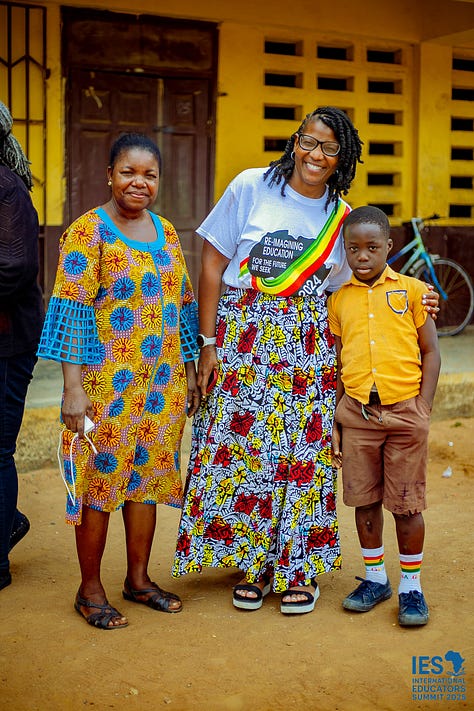
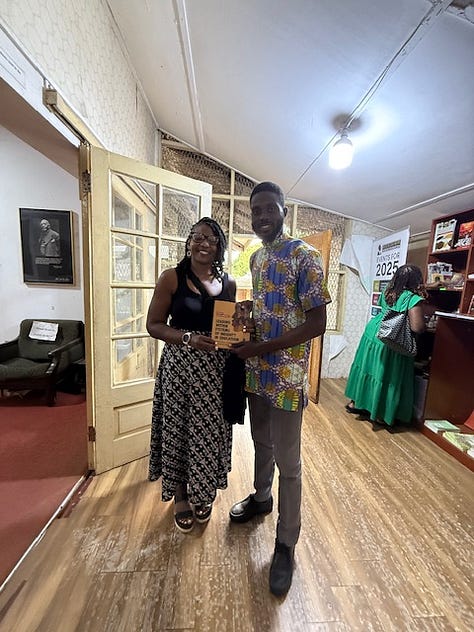
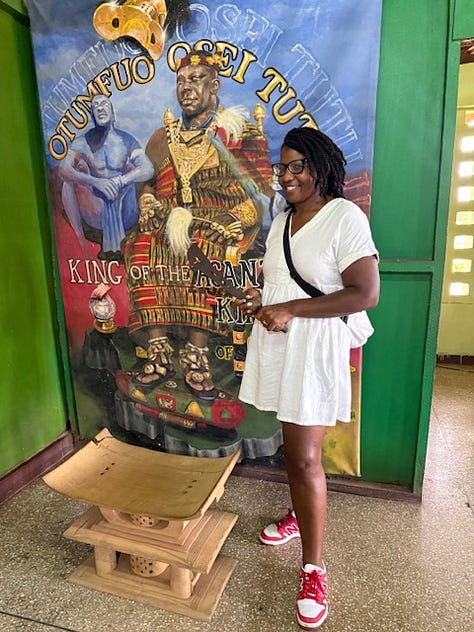
Photo Description: On the left, the author is standing with a student and an administrator from Madina Estate Basic Schools. In the middle is a picture of the author holding her book with a staff member at the W.E.B. Dubois Cultural Center. She donated two copies of her book to the Center’s library. On the right is a picture of the author holding a sword and standing next to a replica stool. They are both sacred objects of the Asante people. All images taken in Ghana.
Check-In:
It was an early Monday morning when my friend and I were on a car ride from Accra to Kumasi, Ghana. Amongst the changing road conditions and villages, we noticed the large number of schools we were passing. Our tour guide explained that there were different classes of schools and that most high schools (public and private) offered boarding for students. He went on to explain that by attending a boarding school, students were exposed to a variety of cultures and customs since schools often pulled students from across a large geographic area of the country.
This conversation added to my continued understanding of the diversity of Ghana, because to say "I visited Ghana" is like saying, "I visited the United States." Those of us who know the U.S. wouldn’t act like visiting Harlem, NYC, is the same as visiting Austin, Texas; so, neither should we act like visiting Accra is the same as visiting Kumasi. Every city, conversation, and place I visited within Ghana gave me new insights into the history, present, and future of the country. As I reflect on my second visit to Accra, here are my reflections on learning about the vastness of the country in three parts:
Madina is a public school in Accra that serves 1,000 students from K-9. The school is overflowing with students wanting to learn and is under-resourced in technology, furniture, and space. However, you don’t hear any excuses coming from the teachers and administrators. All I heard was how one teacher graduates all of her kindergarten students with the ability to read using play-based approaches. I saw a class of over 40 eighth graders self-manage and have respect for their peers. I learned about the whole child approach to learning that the school employs by providing lunch to all students, engaging in cultural dances, and engaging in recreation. I learned that there is a significant resource divide between private and public schools, but there are also informal collaborations between these schools that are ensuring all students are receiving a high-quality academic experience.
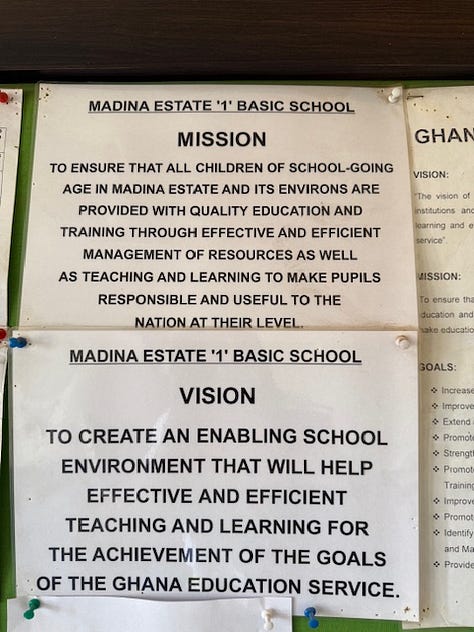
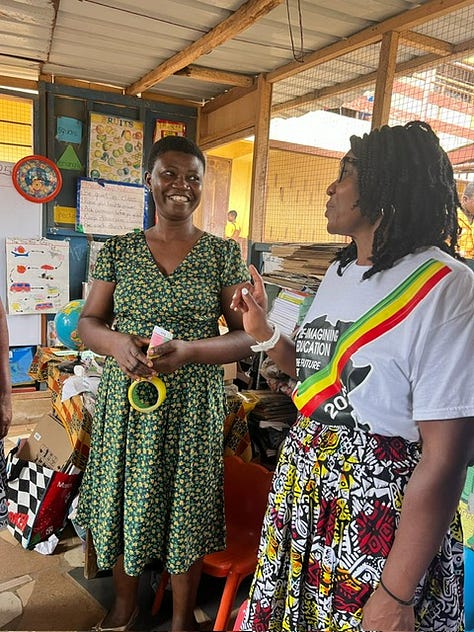
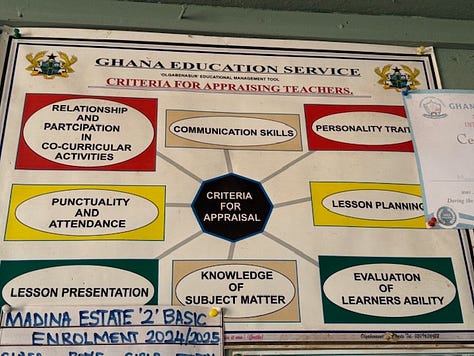
W. E. B. Du Bois Memorial Centre for Pan-African Culture
On our tour of the W.E.B. DuBois Centre, I learned that in 1961, recently elected Ghanaian President Kwame Nkrumah invited Dr.DuBois to Accra, Ghana, to take charge of the Encyclopedia Africana project. The project was something that DuBois hadn’t been able to find funding for in the US. Alongside his eternal quest to memorialize and celebrate the breadth of Black people, DuBois found solace and community in Accra. In 1963, the U.S. government refused to renew his U.S. passport, and he became a naturalized citizen of Ghana. Since DuBois, many other American-born Black people have come to Ghana, especially since the year of the return in 2019. This wave of migration has invigorated the economy but has also created friction as African-Americans sometimes fall into the colonizer ways that they looked to leave behind in the US.
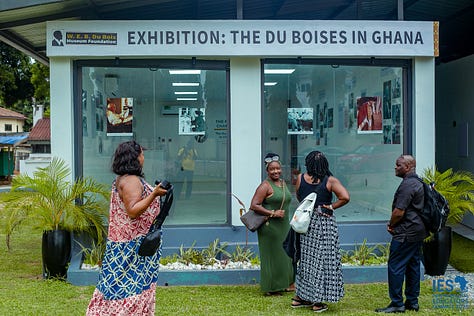
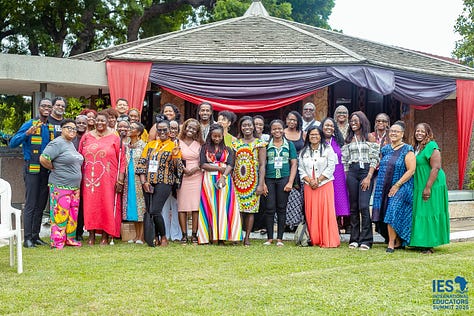
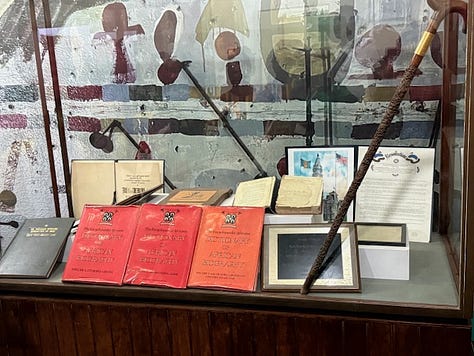
On our ride to Kumasi, I learned a little bit about the willingness of the Asante people to fight for their rights. It wasn’t until I entered the Manhyia Palace Museum that I understood that the power comes from the Queen Mother. The Queen Mother holds the power and lineage. She appoints the king and makes the decisions for the region. I learned about Nana Yaa Asantewaa, who was a Queen Mother who fought the English in the War of the Golden Stool in 1900. I also learned about Nana Konadu Yiadom II, who dethroned two of her brothers because of their behavior as kings, finally appointing her son as king. In other parts of Ghana, women are placed as subservient to men, but in the Asante region, women rule.
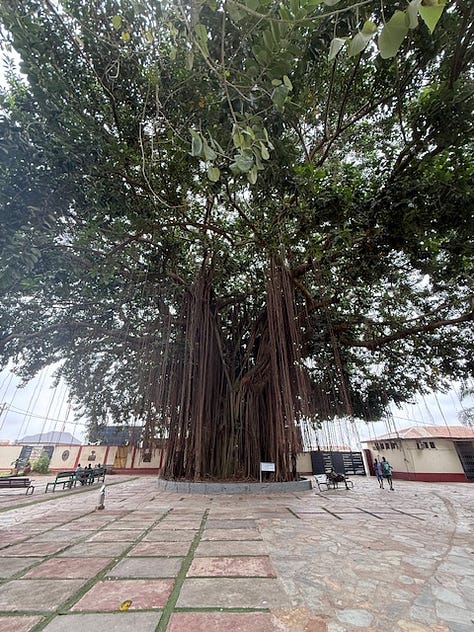
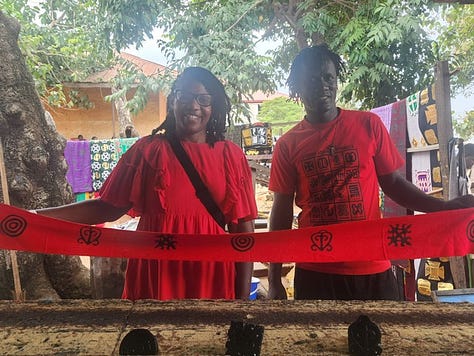
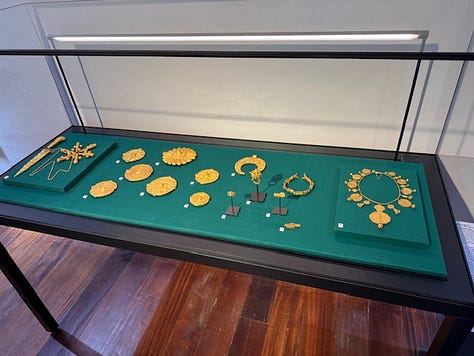
In my first trip to Ghana, I left thinking about the commonalities between Ghana and the U.S. This time, I returned with a recognition that context means everything, and without it, there are misunderstandings and missed opportunities for deep connection and collaboration across the diaspora.
How are you building context and leveraging that understanding to serve the students and communities you serve?
#mondaymotivation: “Now is the accepted time, not tomorrow, not some more convenient season. It is today that our best work can be done and not some future day or future year...” -W.E.B. DuBois
Interview with a Leader of the Global Majority:
Kwaku is a headmaster in Ghana. He has been in the role for over two years. The comments below are Kwaku and do not reflect the opinions of his school system. His first excerpt was in Issue #54: Dreams.
Mary: What type of school are you the headmaster of?
Kwaku: It is a private, all-girls senior high school located in the Eastern region of Ghana, in a rural area.
Mary: How long have you been the headmaster?
Kwaku: Six years and first time being a headmaster.
Mary: How was the school established?
Kwaku: The school's founder is an advocate for gender equity and a businesswoman who wants to advance the cause of women in Ghana. The land for the school was provided by local chiefs. Basically, it is a practice in the more deprived areas in Ghana. But whereby the private person setting up the school has the money, all that she needs is the land. Sometimes land issues in Ghana are a bit complicated. So, if you can obtain a piece of land that is free from litigation, you essentially give back to society.
Mary: How does the school interact with the community?
Kwaku: We have a scholarship for at least one girl in the locality. Something that we are also trying to build.
Kwaku: We also have a program I designed called the Community Project for all our final year candidates to contribute, fundraise, and then we go search for anything in the community that they want us to do for them.
Please let me know if you would like to be interviewed and/or if you would recommend someone to be profiled in this section. I need new interviews!
What I’m Reading, Watching, and Listening To:
READING: Imagination: A Manifesto by Ruha Benjamin explores how we have the power to use our imaginations to challenge systems of oppression and to create a world in which everyone can thrive. Please note that I am an affiliate with Bookshop.org and receive a small compensation for your purchase when you use the book links provided.
ALSO READING: Rest in peace to actor Malcolm Jamal-Warner. He was 54. He was an actor, musician, poet, husband, and a girl dad. His role as Theo in The Cosby Show is iconic. I didn’t attend NYU because of Theo, but having that in common is a fun fact. Gordon Gartrelle forever!
WATCHING: I may be the last person to see Sinners and it was worth the wait. If you need someone new to discuss and unpack the movie with, hit me up!
How to Continue to Support Leading-Within:
Go to Amazon and rate or review the book there! Reviews are a great way for others to see that this book is worth the time to read.
Post about the book on social media using the hashtag #leadingwithin. Even better if it includes a picture of you WITH the book!
Host a book club with your affinity/ERG group. Two study guides are also available on the ASCD website - one for leaders of color and one for white co-conspirators that are perfect for starting a group conversation. For book clubs with participants who have purchased and committed to reading the book, please reach out to me so I can support your journey!
Connect with me to speak to your organization or group about topics covered in the book, like ‘practicing love and rage’, ‘building a coalition’, and ‘taking a stand’.
If this is your first time reading, please go back and read my Introductions post.
Thanks for reading! Let me know what you think. If you like it, please share it with your network!




Thanks so much for sharing about your trip to Ghana, Mary. It really sounds like it was a fascinating trip on so many levels. I appreciated your comment about context because I think it is something we need to keep reminding ourselves of, and so easily overlooked when we are experiencing something new.
Side note...I was also sad about Malcolm Jamal-Warner's sudden death. His role on The Cosby Show was definitely iconic.
Side note 2...didn't know you did your undergrad at NYU. My daughter went there. :)